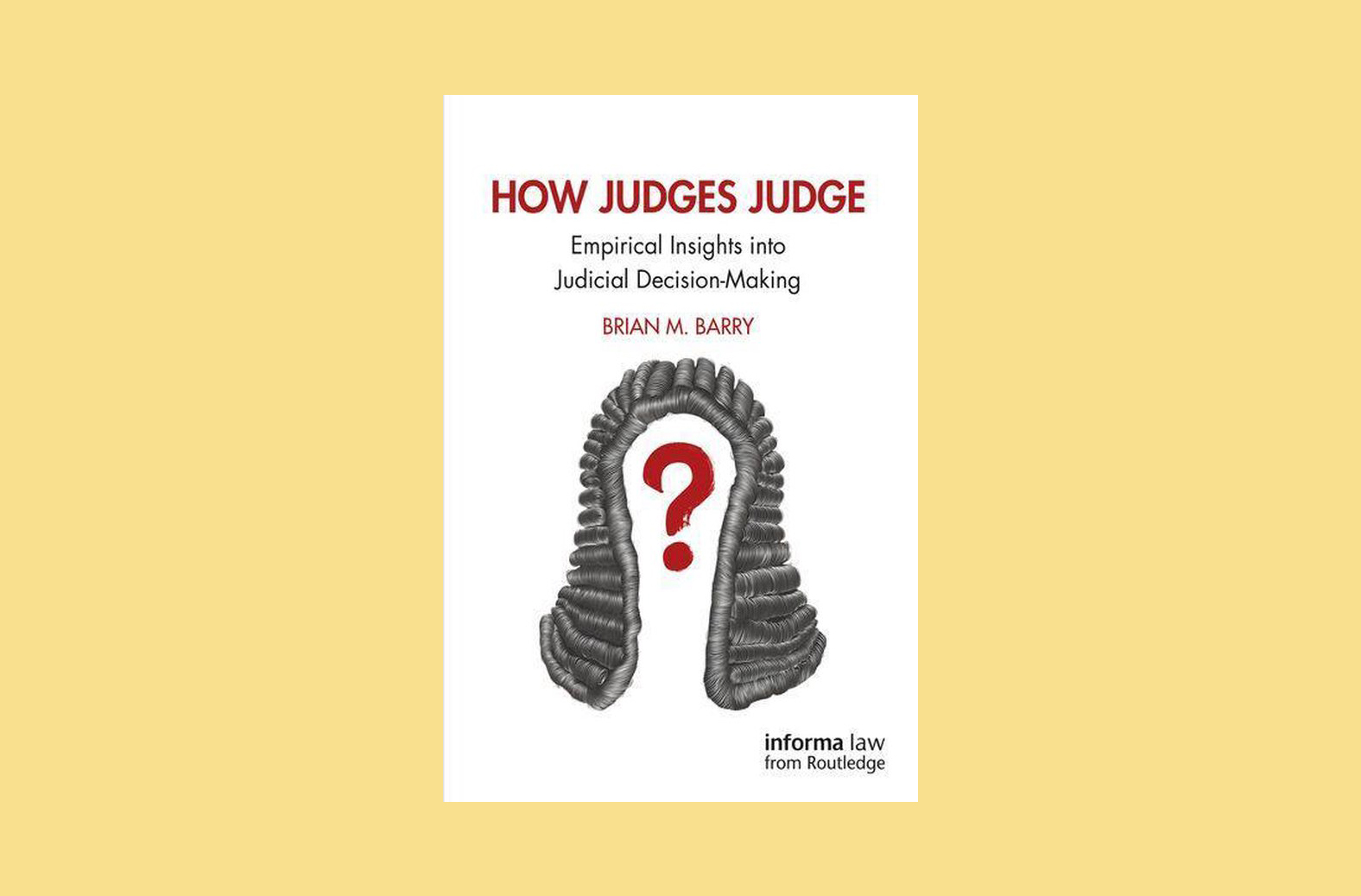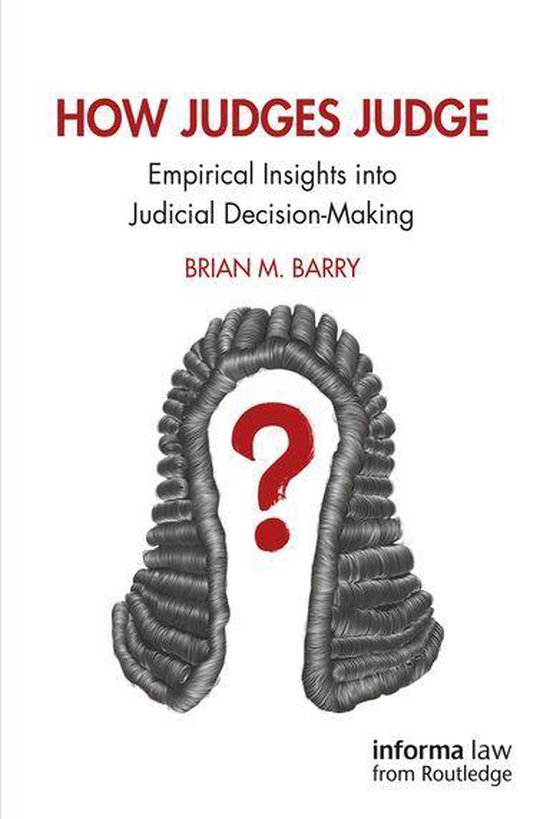
Judges play a critical role in our society. Their decisions hold the power to commit someone to prison for the rest of their lives, to seize someone’s entire asset or to set someone free. Providing the power of their decisions, they are assumed to have the best expertise in the field as well as the best decision-making skills. But is this really the case in practice? Even though they are the most qualified people to make judicial decisions, judges are still humans and they can be influenced by many factors external to the theoretical law practice. In his book How Judges Judge, Brian Barry investigates these factors. Barry is a law lecturer, solicitor and researcher in Ireland who focuses on the external factors that influence the judicial decision making. Barry gathers many empirical studies together and tries to answer this question.
He starts tackling this question by investigating the extent to which judicial decisions are influenced by cognitive biases. Let’s take the first one that springs to mind: confirmation bias. Confirmation bias is specifically looking for information that supports one’s prior beliefs or values. It influences how we gather information, as well as how we interpret it – the primary tasks judges face. In one of the experimental studies that Barry cites, researchers presented 130 German criminal law experts with two hypothetical cases, both involving minor theft situations. The results showed that the participants rated the arguments that were in line with their preliminary decision higher than the arguments that conflict with it. Together with the other studies that Barry mentions in his book, it is clear that judges tend to maintain their initial decision. In judicial cases, this is especially a problem when the judge is asked to reopen a case. This bias makes it less likely that the judges will change their mind about a sentence they have already given before.
Although the studies about confirmation bias consistently support the idea that judges are influenced by their preliminary decisions, the results of the research on hindsight bias are contradictory. Hindsight bias describes the tendency to perceive past events as more predictable than they actually are. For example, Barry says that in a case where the injured cyclist blames the car driver for causing him to fall, the judge will already know that the cyclist was incautious. This can surely be the case, but it is still a misleading prejudice of the judge. Some experimental research supports this indeed, however, some other research has found conflicting results. In some cases, although the judges were initially affected by the hindsight bias, they were able to suppress this and make an objective decision. These are hopeful findings showing us that judges don’t make all of their decisions under the influence of biases as they have the skills to suppress some of them.
Moreover, Barry also discusses several possible ways of combating these biases. One of the most important ones is increasing the awareness of heuristics and biases in judges. According to Wistrich and Rachlinski, making judges aware of these biases encourages them to be more critical about their decisions and move toward self-correcting their errors. Even though it isn’t fully sufficient by itself, there is evidence showing support for this claim. Another way of combating these biases is the ‘consider-the-opposite’ technique in which judges are asked to consider the outcomes that are in conflict with their decisions. Although this technique is found to be very effective to combat the cognitive biases, Barry highlights the fact that we are in need of more research about new techniques. He points out that we know a lot about how the judges are influenced by these biases, but we know very little about how to combat this.
In addition to these cognitive factors, Barry also discusses the effect of judges’ personal characteristics on their decisions. From the influence of their age to their political stance, he dives into almost every factor that might have an effect on judicial decisions and tries to understand how we can combat these.
When I picked up the book, I expected the author, who is a legist himself, to defend the decision-making skills of the judges. However, Brian Barry was quite objective and he fairly analysed many factors that might have an effect on judicial decisions. Besides his successful critical eye, he was also successful in explaining all the psychological terms to make sure his audience, people in the law field, can follow the whole story of empirical research. It was also an interesting read from the perspective of a psychology student. It showed me the critical role of psychological research in improving all parts of the society.
Overall, How Judges Judge was definitely an interesting read. Barry pointed out very important factors that are irrelevant to the theoretical judicial practice but still have meaningful effects on the decisions taken in the courtrooms. He also suggested a variety of ways to improve this. However, he still highlights the fact that we need more research, investigating how we can free the decisions of judges from the external factors.
Available at your local book store or online, starting from €131,99.

Judges play a critical role in our society. Their decisions hold the power to commit someone to prison for the rest of their lives, to seize someone’s entire asset or to set someone free. Providing the power of their decisions, they are assumed to have the best expertise in the field as well as the best decision-making skills. But is this really the case in practice? Even though they are the most qualified people to make judicial decisions, judges are still humans and they can be influenced by many factors external to the theoretical law practice. In his book How Judges Judge, Brian Barry investigates these factors. Barry is a law lecturer, solicitor and researcher in Ireland who focuses on the external factors that influence the judicial decision making. Barry gathers many empirical studies together and tries to answer this question.
He starts tackling this question by investigating the extent to which judicial decisions are influenced by cognitive biases. Let’s take the first one that springs to mind: confirmation bias. Confirmation bias is specifically looking for information that supports one’s prior beliefs or values. It influences how we gather information, as well as how we interpret it – the primary tasks judges face. In one of the experimental studies that Barry cites, researchers presented 130 German criminal law experts with two hypothetical cases, both involving minor theft situations. The results showed that the participants rated the arguments that were in line with their preliminary decision higher than the arguments that conflict with it. Together with the other studies that Barry mentions in his book, it is clear that judges tend to maintain their initial decision. In judicial cases, this is especially a problem when the judge is asked to reopen a case. This bias makes it less likely that the judges will change their mind about a sentence they have already given before.
Although the studies about confirmation bias consistently support the idea that judges are influenced by their preliminary decisions, the results of the research on hindsight bias are contradictory. Hindsight bias describes the tendency to perceive past events as more predictable than they actually are. For example, Barry says that in a case where the injured cyclist blames the car driver for causing him to fall, the judge will already know that the cyclist was incautious. This can surely be the case, but it is still a misleading prejudice of the judge. Some experimental research supports this indeed, however, some other research has found conflicting results. In some cases, although the judges were initially affected by the hindsight bias, they were able to suppress this and make an objective decision. These are hopeful findings showing us that judges don’t make all of their decisions under the influence of biases as they have the skills to suppress some of them.
Moreover, Barry also discusses several possible ways of combating these biases. One of the most important ones is increasing the awareness of heuristics and biases in judges. According to Wistrich and Rachlinski, making judges aware of these biases encourages them to be more critical about their decisions and move toward self-correcting their errors. Even though it isn’t fully sufficient by itself, there is evidence showing support for this claim. Another way of combating these biases is the ‘consider-the-opposite’ technique in which judges are asked to consider the outcomes that are in conflict with their decisions. Although this technique is found to be very effective to combat the cognitive biases, Barry highlights the fact that we are in need of more research about new techniques. He points out that we know a lot about how the judges are influenced by these biases, but we know very little about how to combat this.
In addition to these cognitive factors, Barry also discusses the effect of judges’ personal characteristics on their decisions. From the influence of their age to their political stance, he dives into almost every factor that might have an effect on judicial decisions and tries to understand how we can combat these.
When I picked up the book, I expected the author, who is a legist himself, to defend the decision-making skills of the judges. However, Brian Barry was quite objective and he fairly analysed many factors that might have an effect on judicial decisions. Besides his successful critical eye, he was also successful in explaining all the psychological terms to make sure his audience, people in the law field, can follow the whole story of empirical research. It was also an interesting read from the perspective of a psychology student. It showed me the critical role of psychological research in improving all parts of the society.
Overall, How Judges Judge was definitely an interesting read. Barry pointed out very important factors that are irrelevant to the theoretical judicial practice but still have meaningful effects on the decisions taken in the courtrooms. He also suggested a variety of ways to improve this. However, he still highlights the fact that we need more research, investigating how we can free the decisions of judges from the external factors.
Available at your local book store or online, starting from €131,99.




